Investing in basic healthcare and developing high technology
(Baonghean) - With the leadership and direction of the Provincial Party Committee and the Provincial People's Committee, the work of taking care of building the grassroots health system, focusing on developing high technology, administrative reform, improving the spirit and service attitude of the medical staff has been given attention - These are the decisive factors that have created the success of the province's health sector in the past term.
Strengthening the system of medical examination and treatment facilities
During the past term, the Nghe An Health sector has made great efforts to improve the organizational structure, build a system of facilities, and purchase equipment at medical examination and treatment facilities from the provincial to district and commune levels. At the provincial level, the sector has developed a project and implemented the establishment of a number of specialized hospitals such as the Endocrinology Hospital, Oncology Hospital, Eye Hospital, Trauma - Orthopedics Hospital, Obstetrics - Pediatrics Hospital and a number of provincial medical centers. In particular, the Provincial General Friendship Hospital was put into use at a new location and the construction of phase 2 was started.
 |
| A kidney transplant surgery at the Provincial General Hospital. |
The socialization of health care has received special attention from the sector with the rapid development of the non-public health system. Up to now, the whole province has had 10 private hospitals operating with more than 2,000 beds, bringing the number of existing hospitals to 43 with a total of 7,652 beds, reaching 23.8 beds/10,000 people...
With the policy of socialization, many public health units proactively equip many modern medical devices from contributions of organizations, individuals, joint ventures, and associations, such as: CT - scanner, magnetic resonance imaging system (mri), phaco surgery system, 4D color ultrasound machine, extracorporeal lithotripsy machine, digital X-ray system.
To date, 20 public health units have socialized investment in medical equipment, including 19 hospitals and 1 specialized center; 50 types of medical equipment and machinery have been invested with a total capital value of over 120 billion VND. Notably, many commune health stations have also purchased ultrasound machines and modern equipment.
 |
| Medical staff return to the village to do epidemic prevention and control work in Mon Son commune (Con Cuong). Photo: Tu Thanh. |
Over the past 5 years, the health sector and localities in the province have actively implemented the national criteria for commune health in the period 2011 - 2020. Strengthening the activities of strengthening provincial-level cadres for mountainous districts, increasing the number of doctors working in communes; in 5 years, nearly 500 doctors have been assigned to work at 153 health stations, raising the rate of doctors working in communes to 88%. To date, the whole province has had 305 communes recognized as meeting national health standards, reaching 63.5%, exceeding the target set by the 17th Provincial Party Congress and the national average (60%).
High-tech development
Continuously promoting scientific research activities, receiving and developing high technology is a correct direction that has been affirmed in the past 5 years. Many specialized techniques that were previously only performed at central hospitals have now been deployed and successfully applied at provincial and district hospitals, such as: brain surgery, spinal neurology, thoracic endoscopic surgery, lymph node ablation, spinal fusion surgery with pedicle screw plate, joint replacement, cancer surgery, vascular intervention, coronary stent placement, permanent pacemaker implantation, temporary pacemaker placement, phaco surgery, lasik and paraclinical techniques, diagnostic imaging... notably the success of open heart surgery and kidney transplant at the Provincial General Hospital.
Implementing Project 1816, building satellite hospitals, over the past 5 years, provincial hospitals have welcomed over 60 staff from central hospitals to transfer new techniques. Central experts and doctors have "held hands and guided" according to the hospitals' requests, and in return, provincial hospitals have sent dozens of teams, hundreds of doctors and nurses to study long-term and short-term at central hospitals...
To improve the capacity of the district level, many difficult techniques such as: bone fusion surgery (gallstone surgery, cholecystectomy, laparoscopic prostate fibroid surgery, laparoscopic appendectomy, newborn care/neonatal anesthesia and resuscitation techniques, and phacoemulsification surgery have also been transferred through the enhanced activities of more than 200 doctors.
The Nghe An Health Science Conference was held with the participation of many professors and leading experts from Hanoi, Hue, Ho Chi Minh City, and scientists in the province, creating conditions for doctors in Nghe An to exchange, learn, and promote scientific research activities. Following the success of advanced techniques, Nghe An Health is focusing on preparing to deploy radiotherapy techniques in cancer treatment and in vitro fertilization techniques, organ transplant techniques...
Administrative reform, improving medical ethics
One of the important highlights in the past term is that the health sector has actively implemented administrative reforms, applied information technology in management and operation, thereby minimizing inconvenience for patients coming for examination and treatment. For example, reforming the one-stop transaction office of the Department of Health, clearly decentralizing management to health levels, promoting the role of district, city and town health departments in state management of health at the district level.
Provincial and district hospitals have reviewed and completed administrative procedures, reducing inconvenience for patients, streamlining unnecessary procedures, combining possible steps, ensuring compliance with professional principles and regulations. Typically, Quynh Luu General Hospital and the Provincial Endocrinology Hospital have applied smart medical examination cards since the end of 2013. When coming for examination, people only need to bring their card and referral letter from the lower level (if any). Medical staff scan the card through a projector, all information about the patient will be updated.
During the past term, the health sector has promoted the implementation of the Project "Improving medical ethics" in medical examination and treatment facilities. The implementation of the project has helped the sector make many positive changes, contributing to changing the awareness and responsibility of cadres, workers and employees, improving their sense of responsibility, service attitude and behavior towards the people. The health sector has been actively directing the improvement of medical ethics in medical examination and treatment units with specific measures such as perfecting the 24/7 hotline at the units of the health department; strengthening the work of opening the patient's suggestion box, collecting opinions and surveying the satisfaction of patients and their relatives during the treatment period; making medical ethics standards the main criteria for monthly, quarterly and yearly emulation evaluation...
Thanh Son - Tu Thanh
| RELATED NEWS |
|---|
